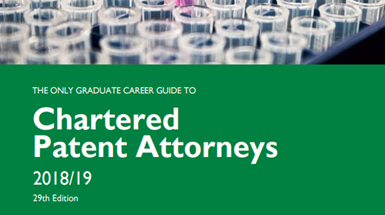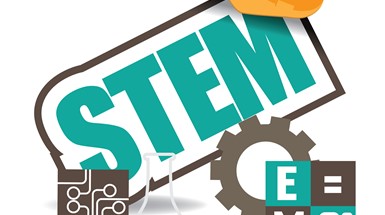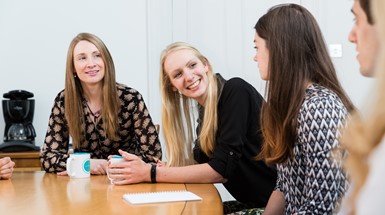 Rebecca
Rebecca
Do you feel that women are more aware of opportunities in STEM roles in 2018?
I do not necessarily think that women are more aware of opportunities in STEM roles, however, I think that more women are studying STEM subjects at university and that in turn is leading to more women pursuing STEM careers.
Do you think more women are entering the IP sector now?
This is difficult to answer as I have not been in the IP profession very long. The impression that I have got from speaking to qualified attorneys is that the IP sector was traditionally viewed as a male-dominated industry. I would still say that there seem to be more male trainee patent attorneys but I think that the margin between the number of male and female trainees has decreased. This could be a result of more women studying STEM subjects at university though.
What attracted you to working in an IP role?
I have always wanted to pursue a career in which I can continue to learn and be challenged on a daily basis. Having been interested in both law and science, IP seemed like the prefect fit.
Were you concerned about it being quite traditionally male?
No not at all.
What misconceptions did you face before pursuing this career?
I was worried that without a PhD I would not be able to get a job as a trainee patent attorney. There is a common misconception that you will not be able to get a job as a trainee patent attorney without a PhD.
Were you made aware of IP careers at education level, or was it a passion for science that lead you here?
It was a combination of the two for me. I found out about the profession through my careers service at university when I went to speak to them about doing a law conversion course after speaking to them about wanting to continue using my degree as well.
What do you find most fulfilling about working in the IP industry?
Every day is different! I like that I am constantly faced with new challenges and am always learning about a diversity of new technologies.
It is also particularly satisfying when we get a patent granted for a client.
 Grace
Grace
Do you feel that women are more aware of opportunities in STEM roles in 2018?
I think that more women are taking on roles which require a technical background in STEM subjects and that this increase has been gaining momentum for a good few years now, so we are now seeing a dramatic increase in women in roles which require a technical background in STEM today, compared to, say, 50 years ago.
Do you think more women are entering the IP sector now?
Whilst I haven’t been in the profession long, statistically speaking I would guess that the number of women in the IP sector has probably increased, since the IP sector itself is growing due to increased visibility. More and more companies are beginning to realise the importance of IP, from single inventors, to SMEs, to larger corporations.
What attracted you to working in an IP role?
My gender never factored into my thinking when I was looking for a career. Ultimately I was looking for a career which would challenge me, and I have found this is certainly the case! This role keeps me engaged, interested, and means I am constantly improving my abilities and skills set.
Were you concerned about it being quite traditionally male?
No, I can’t say I was. I studied physics and that is “traditionally male” I suppose but I never felt marginalised or pushed aside because of it. At my university, female physics students weren’t as numerous as male physics students but it never felt like an issue. I think because of this I never had any concerns about going into a role that might employ more men than women, though I didn’t know the industry well-enough to have been able to say before I started.
Were you made aware of IP careers at education level, or was it a passion for science that lead you here?
Definitely the latter, since I did a BSc, IP was almost certainly never mentioned. I think possibly also because Physics is mathematical and theoretical there’s not really that much registrable IP created, even at PhD level. I suspect (though I can’t speak for all physics PhD projects!) that much research would be protected by copyright and so our lecturers never really discussed it with us. We did cover copyright at school during an English lesson, but not IP as a commercial asset or the IP sector as a career.
What do you find most fulfilling about working in the IP industry?
I’m constantly learning new things. Whilst I’m not working in an engineering or research role, I am always having to apply knowledge learnt during my degree in order to understand inventions. I’m also learning every day about IP Law, client care, growing a business, marketing and more.
 Tina
Tina
Do you feel that women are more aware of opportunities in STEM roles in 2018?
Compared to, say, 50 years ago, I do think that more women are pursuing careers in stem in 2018. As more and more work is done to break down barriers created by gender stereotypes, I think women are feeling more and more confident about entering a stem profession.
Do you think more women are entering the IP sector now?
I think more people in general, both male and female, are entering the IP profession today. I think this is because the IP profession is more visible than ever before, and people are more aware of the opportunities available. Wynne-Jones especially have been working hard to promote the IP profession to university stem students as an alternative to practicing science (for those who do not want to work in a lab)– and because of this we have seen a huge increase in the number of students applying to be a trainee patent attorney.
What attracted you to working in an IP role?
I was attracted to the IP profession because of its unique combination of science and law, both of which I enjoy. I love learning and developing my skills, and if I am not constantly being challenged, I honestly get bored and lose interest. The IP profession is continuously evolving, and I felt like it would provide me with sufficient challenges and learning opportunities, such that I would remain engaged and excited by my work for a long, long time.
Were you concerned about it being quite traditionally male?
The profession being traditionally male was something that honestly never crossed my mind when applying for a job within the IP sector. My only concern was whether or not the profession would provide enough positive challenges to keep me interested over the long term. In the end, I decided that it did provide what I was looking for, and that’s really all that mattered to me.
Were you made aware of IP careers at education level, or was it a passion for science that lead you here?
It was my passion for science that led to me entering the IP profession. I have always been interested in multiple areas of science, and could never decide which one specific field I should follow as a career. However, as a trainee patent attorney, I need to combine multiple areas of stem to understand my client’s inventions, which I find much more interesting and satisfying.
What do you find most fulfilling about working in the IP industry?
The IP profession provides me with a diverse range of challenges every day, therefore I am never bored at work! One minute I will be trying to technically understand my client’s invention and how it works, and the next minute I will be providing a client with legal advice relating to protecting their invention overseas. It’s the perfect combination of science and law! I spend most of my time problem solving, and I find it very satisfying when I am able to come up with solutions that will benefit my clients.
 Tasha
Tasha
Do you feel that women are more aware of opportunities in STEM roles in 2018?
I feel like companies are making a push to hire a more equal workforce, so maybe those efforts will show in a few years time (or they are already showing and I haven’t noticed!).
What attracted you to working in an IP role?
As a mechanical engineer, I wanted to use my degree but without taking a traditional engineering graduate job.
Were you concerned about it being quite traditionally male?
I had no idea it was traditionally male! I came from an engineering background and I naturally thrive in male-dominated environments, so it didn’t even cross my mind. In fact, if the profession had a large percentage of women, I would likely have been put off!
Were you made aware of IP careers at education level, or was it a passion for science that lead you here?
I had known about it from a young age but was strongly opposed against it until my final year of uni when I realised it might be something I’d be interested in! My graduate job searching was more a case of narrowing it down by what I didn’t want to do, or felt I couldn’t do, than what I wanted to do!
What do you find most fulfilling about working in the IP industry?
Working with loads of different clients and different technologies.




